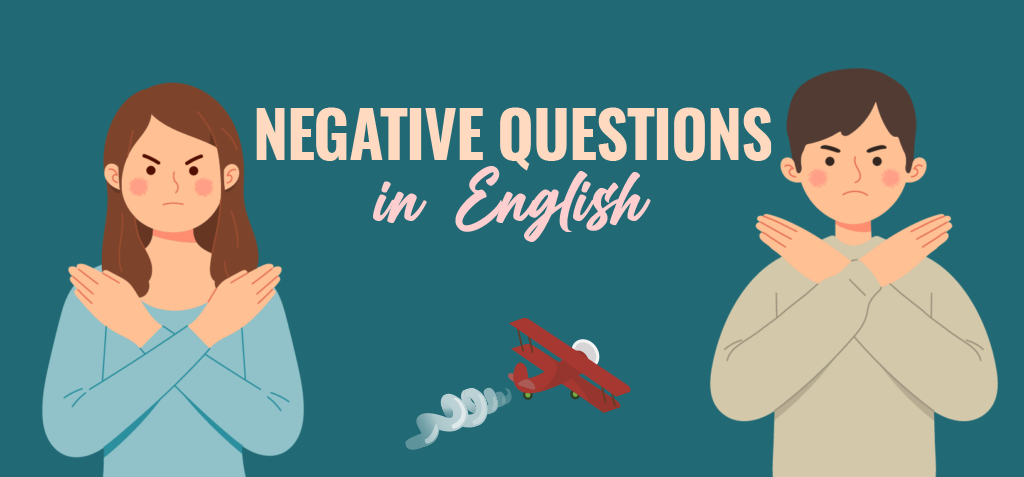Negative questions in English

Probably one of the things that you have already studied is how to ask questions and also, how to construct negative sentences in the verb tenses that you know. Contrary to what happens in Spanish, in English it is not enough to put the question mark in a sentence to make it a question: you have to change the structure of the given sentence.
ÍNDICE DE CONTENIDOS
Something similar usually happens in the negative: not only the no is adjusted because there are several conditions to take into account and the different verb tenses configure the negative in different ways. Regarding negative questions in English
In this post we will update you on the most important things that surround negative questions in English, when are they used? and how are they made up? We look forward to answering your questions about it. And remember, don’t forget to check the next official exam sessions.
What are the negative questions?
The total questions (Don’t you like it?) And also the partial questions (What didn’t you tell him?) can be negative. The meaning of negative questions is a function of various syntactic, semantic, and also discursive factors.
How to change to the negative form in English?
To convert an affirmative sentence into a negative we use the auxiliary do + not (does not in 3rd person singular). In colloquial language, it is usually contracted into don’t and doesn’t.
When are negative and interrogative questions used at the same time?
We use negative questions in cases where we need to show surprise or exclamation, and when we require that someone who is listening to us agree with what we say.
In this regard, those of us who speak Spanish have a certain sale compared to other languages because the negative questions in English are very similar to how it is used in our language.
Structures
Negative questions are constructed as follows:
Non-contracted form
- Auxiliary question + subject + not + verb + complements +?
Did you not do your homework?
¿No hiciste tu tarea/tus deberes?
Are you not taking the job?
¿No vas a aceptar el trabajo?
Will you not buy a car?
¿No comprarás un auto/coche?
When speaking we almost always use the contracted form with the following structure:
Contracted form
- Contracted negative auxiliary + subject + verb + complements +?
Don’t you want to visit your aunt?
¿No quieres visitar a tu tía?
Won’t they travel to Spain next month?
¿No viajarán a España el próximo año?
Wouldn’t you come to live here without a second thought?
¿No te vendrías a vivir aquí sin pensarlo dos veces?
Situations in which negative questions are used
To ratify what we consider to be true
- Wouldn’t you have a wrench?
¿No tendrías una llave inglesa?
- You didn’t have a bike when you were little.
¿Tú no tenías una bicicleta cuando pequeño?
To politely demonstrate your thinking in an indirect way
- It would not be good to bike this Sunday.
No sería bueno practicar bicicleta este domingo.
- We are comfortable in this pool, right?
Estamos a gusto en esta piscina, no?
To show uncertainty about something that you expect to happen or is happening
- It’s cold here, won’t we go?
Hace frío aquí ¿No nos vamos?
- Haven’t you left home yet?
¿Aún no ha salido de casa?
In English there is a courtesy formula for what usually uses negative questions through would and will, as we have already seen in some examples.
How to ask negative questions in simple times?
Next, we treat the formulas to configure the negative questions through the verb to be, taking into account that the negative questions have two forms, with contraction and without contraction.
Negative questions with the verb to be, in the present simple, in the past simple, and in the future simple (in this order):
With contraction
- Wasn’t she in Barcelona?
No estaba en Barcelona?
- Haven’t you seen your girlfriend?
¿No has visto a tu novia?
- Don’t you take the car?
¿No te llevas el coche?
Without contraction
- Are you not engaged to her?
¿No estás comprometido con ella?
- Do you not like chocolate?
¿No te gusta el chocolate?
- Did you not leave early?
¿No te fuiste pronto?
We show you below in continuous times the negative questions that are formed with to be:
With contraction
- Aren’t you working?
No estás trabajando
- Won’t you be cooking?
¿No estarás cocinando?
- Weren’t you leaving?
¿No te marchabas?
Without contraction
- Are you not dancing?
¿No estás bailando?
- Will you not be sleeping?
¿No estarás durmiendo?
We hope that this article has helped you to avoid mistakes and fundamentally to learn how questions are formulated, once you have taken note of the construction of negative sentences in the tenses that you already know after you know how to change the structures of the phrase. If so, congratulations and we continue to invite you to consult our page.



Landau destacó que el comentario de Trump estaba dirigido a la
habilidad de Biden en sus interacciones con líderes
como Putin y Xi Jinping.
We love the explanation and examples! Would you please help me ask a negative question for “I’m your best friend.”